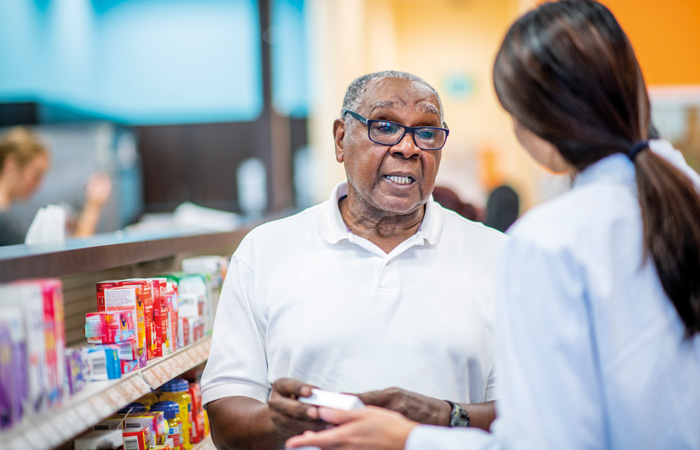The contribution of pharmacy to public health
There are numerous examples of pharmacy teams contributing to public and population health and some local innovations have been translated into formally contracted services where evidence has demonstrated effectiveness. The Covid-19 pandemic led to greater recognition of how the community pharmacy network could connect with the wider NHS, for example with the Covid-19 vaccine delivery, in turn leading to a clearer view of how powerful integration can be.
Some examples of current implementation of public health services within community pharmacies across the UK include:
- Identifying people with undiagnosed high blood pressure by offering opportunistic blood pressure and pulse rhythm testing (NHS Blood Pressure Check Service)
- Community pharmacy-delivered stop-smoking interventions
- Access and provision of sexual health, reproductive health and HIV services. For example:
- Access to emergency hormonal contraception (EHC)
- Chlamydia screening and treatment as part of the National Chlamydia Screening Programme for 15 to 24-year-olds
- Condom distribution
- Pregnancy testing.
- Community pharmacies across Tayside in Scotland contributed to the elimination of Hepatitis C Virus (HCV) in Scotland by testing for, diagnosing and delivering direct antiviral drugs for HCV in people who inject drugs
- In Northern Ireland, the Building the Community Pharmacy Partnership (BCPP) brings pharmacy and the community together to reduce health inequalities. BCPP has supported communities and community pharmacists in almost 1,000 funded projects to address locally defined needs allowing people to make connections, listen to and understand each other better and work together to address the social determinants of health and health inequalities
- Offering vaccinations (e.g. flu jabs) has been part of the community pharmacy contractual framework across all four countries for several years; complementing the service provided by GP practices. In some areas of the country, pharmacists have been commissioned locally to provide the pneumococcal vaccine. Since 2020, more than 1,500 pharmacy sites across all four nations have been Covid-19 vaccination sites.
Other areas currently in development include:
- Having conversations and offering brief advice to people who they think may be experiencing mental wellbeing issues
- Supporting healthy ageing by, for example, supporting older people and their carers to prevent or reduce falls, increasing levels of physical activity, maintaining a healthy weight, reducing the risk of social isolation and loneliness, reducing the risk of dementia, supporting people diagnosed with dementia, delaying the progress of dementia and reducing the need for medicines.
HLPs and similar schemes
The Healthy Living Pharmacy (HLP) framework in England aims to achieve consistent provision of a broad range of health promotion interventions to meet local need, improving the health and wellbeing of the local population and helping to reduce health inequalities.
Evaluations of HLPs have demonstrated an increase in successful smoking cessation rates, extensive delivery of alcohol brief interventions and advice, emergency contraception, targeted seasonal flu vaccinations, common ailments, NHS Health Checks, healthy diet, physical activity, healthy weight and pharmaceutical care services.
There are similar schemes/approaches to HLP in Scotland and Northern Ireland. Scotland’s core public health service includes a requirement for the pharmacy to provide a health promoting environment including participating in national campaigns. There is also a new Pharmacy First Service for minor health conditions.
In Northern Ireland, Health+ Pharmacies recognises the important role pharmacy has to play in keeping communities healthy and well. To become accredited, a Health+ Pharmacy will have shown that it meets a variety of standards including staff training, the premises and working with a range of organisations to support health and wellbeing.

